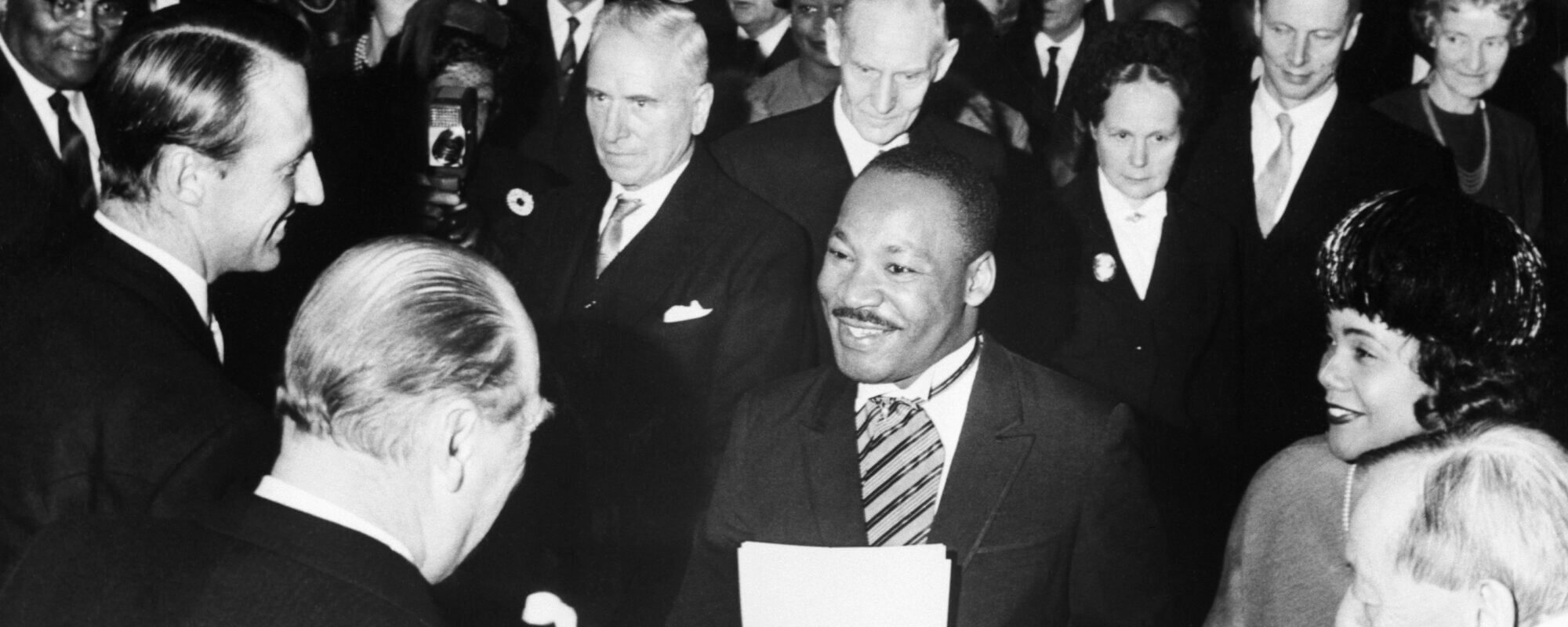The unknown and inspiring history of Black contributions to arms control and disarmament.
Martin Luther King, Coretta Scott King, and a long list of Black leaders and cultural figures in the 1950s, the 1960s, and 1980s were at the forefront of efforts to call attention to the danger of nuclear weapons. Our series, “Black Voices on the Bomb,” recalls that fascinating history.
Dr. Martin Luther King, Jr.
Biography
In 1964, Martin Luther King, Jr. became the youngest recipient of the Nobel Peace Prize. During his acceptance speech, he delivered powerful warnings to the public about the threat of war and the growing arms race between the US and the Soviet Union. He spoke about the necessity of disarmament and the link between nuclear weapons and the struggle for black freedom.
Nuclear Disarmament Advocacy
Martin Luther King, Jr.’s advocacy for nuclear disarmament did not begin or end in 1964. In the late 1950s, King consistently opposed the nuclear arms race, including nuclear weapons testing and the use of nuclear weapons in war. In 1957, King declared that he believed all nuclear weapons should be banned and that a nuclear war would be catastrophic. He joined the National Committee for Sane Nuclear Policy (SANE) in 1958. During his membership, King sponsored and signed many petitions, letters, and advertisements for the organization.
His advocacy for disarmament continued outside of his work for SANE. Martin Luther King, Jr. conveyed his message of nuclear disarmament through his speeches, interviews, and other public appearances. During his address at the War Resisters League’s annual dinner in 1959, he linked the domestic struggle for racial justice with the global campaign for disarmament, saying:
“Not only in the [American] South but throughout the nation and the world, we live in an age of conflicts, an age of biological weapons, chemical warfare, atomic fallout and nuclear bombs… Every man, woman, and child lives, not knowing if they shall see tomorrow’s sunrise…What will be the ultimate value of having established social justice in a context where all people, Negro and White, are merely free to face destruction by strontium 90 or atomic war?”
Dr. King remained committed to the antinuclear weapons movement through the next ten years of his life. In 1962, following the Cuban Missile Crisis, King criticized the American commitment to increased military spending on nuclear weapons development. He believed those funds should be used to increase teacher salaries and build schools in underserved communities. Two years later, during his acceptance speech for the Nobel Peace Prize, he warned that in the nuclear age, society must address all three of its greatest problems: racial injustice, poverty, and war.
Many who teach about Martin Luther King Jr’s peace activism focus on his criticisms of the Vietnam War without recognizing his role in the fight for nuclear disarmament. Dr. King represents a long legacy of Black Americans leading the call for peace and disarmament.
Influence of Coretta Scott King
King’s anti-nuclear stance was in part inspired by his wife, Coretta Scott King, who independently advocated for numerous social justice causes, including nuclear disarmament. King followed in his wife’s footsteps when he joined SANE. Even after his death in 1968, Coretta Scott King continued to advocate for nuclear disarmament and peace. For more information on Coretta, please read our feature on her.
Bibliographic Notes
Sources
- “About Dr. Martin Luther King, Jr..” The King Center, February 3, 2022. https://thekingcenter.org/about-tkc/martin-luther-king-jr/.
- “National Committee for a Sane Nuclear Policy (SANE).” The Martin Luther King, Jr. Research and Education Institute. April 22, 1957. https://kinginstitute.stanford.edu/national-committee-sane-nuclear-policy-sane.
- “Martin Luther King Nobel Lecture.” NobelPrize.org. December 11, 1964. https://www.nobelprize.org/prizes/peace/1964/king/lecture/.
- Vincent Intondi, “Arms Control Now.” Why Dr. King Opposed the Atomic Bomb | Arms Control Association. January 19, 2015. https://www.armscontrol.org/blog/MLKDay.
- Vincent Intondi, “Nuclear Weapons and the Legacy of Dr. King.” Outrider, January 10, 2019.. https://outrider.org/nuclear-weapons/articles/nuclear-weapons-and-legacy-dr-king.
For More Information
For more on King, check out the King’s Center’s biography. To learn more about the Black freedom movement’s historical connection to disarmament, check out Vicent Indondi’s article, “W. E. B. Du Bois to Coretta Scott King: The Untold History of the Movement to Ban the Bomb” or his article, “African American Leadership in the Fight for Nuclear Disarmament.”


